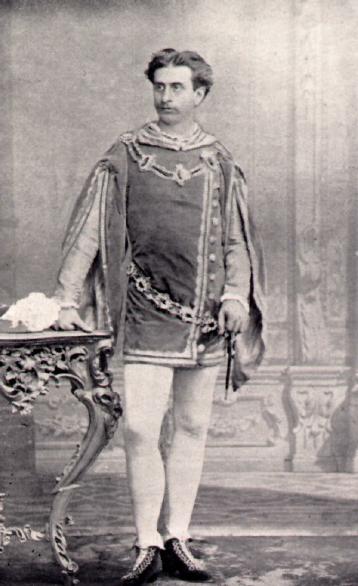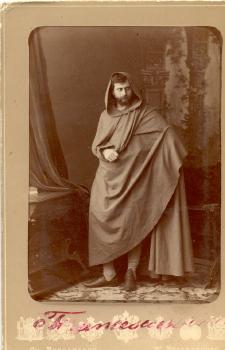Francesco Marconi
14 May 1853 (eventually 1855) Rome – 5 February 1916 Rome
Originally, Marconi's father had been a well-off ironmonger, one of Rome's best-known; but in the wake of the end of the Papal State
(and its integration into the Kingdom of Italy), Rome got into an economic crisis, and so did Marconi senior. So young Francesco
needed to work as a carpenter.
His voice was discovered by chance when he serenaded a girl in Trastevere, the iconic plain-people district in central Rome. Marconi
was trained by retired baritone Ottavio Bartolini (he was also the teacher of Francesco Signorini and Paolo Wulman). His debut took place in 1876 at the Teatro Pagliano (the later Teatro Verdi) in
Florence, as Boito's Faust.
In 1878, Marconi was already in Spain: at the Teatro Real in Madrid (as Gounod's Faust, this time), in Alicante or in Alcoy.
For the most part, his career evolved at the large Italian opera theaters: La Scala in Milano, both Teatro Costanzi and Teatro Argentina
in Rome, Teatro San Carlo in Naples, Teatro Comunale in Bologna, Teatro Regio in Torino. Marconi was considered one of the very most
important tenors of his time, Tamagno's equal, and outdone only by Gayarre.
In 1883 and 1884, he split his time between Covent Garden and the Mariinskij Theater. Further guest appearances led him to the Bolshoj
(1882), to Buenos Aires, Rio de Janeiro, Monte Carlo, Prague, Berlin, and in 1888 to New York City, where he was America's first Otello
at the Brooklyn Academy of Music; of course, a way too heavy role for him, so he had no success.
His standard repertory included Gennaro, Fernand, Edgardo, Arturo (Puritani), Duca, Alfredo, Riccardo, Enzo Grimaldo, Ruy Blas,
Lohengrin, Raoul, but also Vasco da Gama and Radamès. Marconi sang up to his death.
In RA format
In RA format
A word about "I mulattieri": while Marconi is excellent here, Antonio Cotogni even outdoes him – in my opinion also as far as singing is concerned, but certainly as far as historical
importance. This is Cotogni's only published recording. He was 77 when it was made, and sure doesn't sound that old. Cotogni, for the very few who don't know yet, was one
of the most important Italian baritones of the 19th century, the second oldest singer on record (born 1831), and definitely the most important and most successful singing teacher
ever – among his pupils were, to name but the most famous, Jean de Reszke, Beniamino Gigli, Mario Basiola, Mattia Battistini, Augusto Beuf, Guido Ciccolini, Giuseppe De Luca,
Benvenuto Franci, Carmen Melis, Vladimir Kastorskij, Enrico Nani, Ellison van Hoose, Domenico Viglione-Borghese, Julián Biel, Giacomo Lauri-Volpi, Mariano Stabile, Carlo
Galeffi and Dinh Gilly. And he was, though not his voice teacher, also of particular importance for Francesco Marconi. Marconi wrote about their first joint performance, in
Puritani: "When I came to the first rehearsal, and heard him sing his first line, Or dove fuggo io mai, I was outright shocked by his terrific art and said that I didn't want to go
on singing. What an overwhelming artist! The great and impressive melodies that Bellini had created for this divine opera became even greater thanks to Cotogni's incomparable
interpretation. And I'm not ashamed of confessing that I've learned Puritani and a considerable part of my other repertory from Toto Cotogni."
Checco Marconi nei Puritani al Teatro Argentina di Roma
Marconi was in complete control of his vocal power during the entire work, especially during the great duo of the last act. Together
with Pinkert, a great artist, they generated straight forward and legitimate enthusiasm. Il Messaggero, 1896
Starting with Marconi (why not start with him?), all were up to their parts. The great Roman artist was delightful. His voice
fascinated. Maybe not even he himself realizes the natural effect that derives from his large phrasing, his colored accents, full of
passion and soul. The aria di sortita A te, o cara and the last duo with the soprano Vieni fra queste braccia were sung
by Marconi like nobody else can today. The public rewarded his favorite with deafening and thunderous applause. La Tribuna,
1896
|
Discography
Gramophone, Milano, November 1903
Con366 Rigoletto (Verdi): Questa o quella 52788
Con367 Mefistofele (Boito): Dai campi, dai prati 52016
Con368 Néron (Rubinstein): Invano, invan 52017
Con720 Evgenij Onegin (Chajkovskij): Lontan, lontan 052054
Con721 Africaine (Meyerbeer): O paradiso 052055
Con722 Gioconda (Ponchielli): Cielo e mar 052056
Con723 Mefistofele (Boito): Giunto sul passo estremo unpublished
Con724 Requiem (Verdi): Ingemisco 052057
Con728 Non guardami così (Palloni) 052065
Con729 Gioconda (Ponchielli): Cielo e mar unpublished
Con730 Bella cantiam l'amore (Mascagni) 052058
Gramophone, Milano, about December 1907
11131b Néron (Rubinstein): Invano, invan 2-52631
11133b Rigoletto (Verdi): Questa o quella 2-52632
1414c Roméo et Juliette (Gounod): Angiol che vesti (w. Mililotti) 054186
1415c Geisha (Jones): O mia Mimosa (w. Mililotti) 054187
1416c Martha (Flotow): Il suo sguardo è dolce incanto (w. Mililotti) 054188
1417c Lucrezia Borgia (Donizetti): Di pescatore ignobile 052200, VB27, Vic 88226, 76004
1418c Guarany (Gomez): Sento una forza indomita (w. Mililotti) 054189
1419c Lucrezia Borgia (Donizetti): Madre se ognor lontano (w. Mililotti) 054190
Gramophone, Milano, May 1908
11170b Mefistofele (Boito): Dai campi, dai prati 2-52672
11171b Ruy Blas (Marchetti): Ed ei non viene ancor 2-52662
11178b In questa sera (Denza) 2-52673
11180½b I mulattieri (Masini) (w. Cotogni) 54373
11185b Favorita (Donizetti): Una vergine 2-52663
1437c Africaine (Meyerbeer): O paradiso 052233
1438c Lucia di Lammermoor (Donizetti): Fra poco a me ricovero 052221
1439c Forza del destino (Verdi): Solenne in quest'ora (w. Della Torre) 054214
1440c Lucia di Lammermoor (Donizetti): Tu che a Dio 052234
1446c Puritani (Bellini): Vieni, vieni fra queste braccia (w. Galvany) 054208, DB481, VB4, Vic 89046
Source for the discography: Gesellschaft für historische Tonträger, Wien
For the biography: reference 1: Kutsch & Riemens; reference
2; reference 3, reference 4: www.operalibera.net
(defunct)
I wish to thank Thomas Silverbörg for the picture.
|

